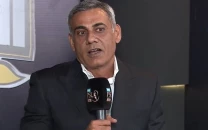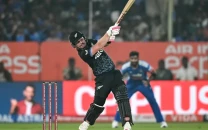Deeper and deeper
In the murky world of cricket corruption, rarely do you get a case so clear-cut.

Pakistan cricket has been through many periods of shame but this may be the most humiliating. The only option is to cast aside all the bad eggs and start from scratch. The majority of the team stands exposed and this time it should have no defenders blaming the accusations on racism, colonialism or any other imagined prejudice. For too long, the corruption that is endemic to Pakistani cricket has been excused, justified and swept under the carpet. All through the 1990s, our cricketers were embroiled in one match-fixing controversy after the other and yet the only people who paid the price with their careers were Rashid Latif and Basit Ali, the two whistleblowers who brought match-fixing allegations to the public’s notice. Why does the Pakistan team which so frequently land up in trouble? Has the culture of corruption in our country filtered down to its sportsmen? Is the relative lack of awareness and financial insecurity of teenagers such as Aamir taken advantage of? Do they simply yearn for material riches and willingly abandon all morality to attain them? These are all factors. They reflect the kind of society we have become. But other nations – India, South Africa and Australia – have also faced match-fixing scandals. The willingness to impose bans, to address the matter head on may have saved them from the kind of ignominy we face now.
The Pakistan Cricket Board (PCB), which has had to deal with numerous scandals in the last few years, including drugs charges and player rebellions, has a formula to make it seem as if it is holding players accountable without actually taking any meaningful action. An inquiry is held, long bans are handed out and then, when the furore dies down a bit, the bans are quietly overturned. Of course, all this does not mean that the PCB be let off the hook. Given the variety of disasters that have taken place under Chairman Ijaz Butt’s watch, it would be a travesty if he remains in the post. Only President Asif Ali Zardari has the authority to remove the PCB chairman. He needs to exercise that authority immediately.
Players who have a shady past need to be permanently excluded from positions of authority and officials against whom allegations have been made should not be included in squads. When the coaching staff includes Waqar Younis and Ijaz Ahmed, cricketers who featured prominently in the match-fixing scandals of the '90s, younger players will get the impression that cheating will go unpunished. There may be some, including the players, who argue that spot-fixing is not as major a crime as match-fixing. These kinds of justifications are pointless because the game has to be played in a competitive spirit and that any attempt to compromise that – for even a ball – means that the players are playing not to represent their nation but to make some extra money. And that is why those who indulge in this are called cheats.
Published in The Express Tribune, August 31st, 2010.



















COMMENTS
Comments are moderated and generally will be posted if they are on-topic and not abusive.
For more information, please see our Comments FAQ